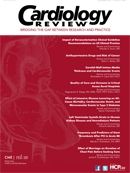Publication
Article
Cardiology Review® Online
News&Trends
Heart Failure Treatments Less Likely to Reach Those Without Private Health Insurance
A
study in the Journal of the American College of Cardiology found that people with Medicare or Medicaid and those without health insurance were less likely to get potentially lifesaving treatments for HF.
Researchers analyzed 99,508 HF admissions from 244 hospitals between January 2005 and September 2009. Patients were grouped on the basis of payer status—private/health maintenance organization, Medicare, Medicaid, or no health insurance. The Medicare, Medicaid, and no-insurance groups were less likely to receive evidence-based treatments including beta blockers, as well as implantable cardioverter-defibrillators or anticoagulation for atrial fibrillation than were those with private insurance. The patients with Medicare, Medicaid, and no health insurance also had longer hospital stays.
Kapoor JR, Kapoor R, Helkamp AS, Hernandez AF, Heidenreich PA, Fonarow GC. Payment source, quality of care, and outcomes in patients hospitalized with heart failure. J Am Coll Cardiol. 2011;58:1465-1471.
Higher Risk of Heart Failure in Postmenopausal Women With Less Education, Lower Income
D
ata from the Women’s Health Initiative Hormone Trials were used to examine the association between socioeconomic status levels and incident heart failure (HF) hospitalizations among healthy postmenopausal women.
The study included 26,160 healthy postmenopausal women who self-reported education level and income. Statistical adjustments were made for race; demographics; comorbid conditions, including whether the women smoked and drank alcohol; behavioral factors; and hormone and dietary assignments. The women were followed for 8 years.
Researchers found that women in the lowest income bracket (under $20,000) had a 56% higher risk of heart failure than the women in the highest income bracket (over $50,000). Women that didn’t graduate from high school were 21% more likely to be hospitalized for HF than college grads were.
The researchers said that less access to preventive care, less communication with physicians, and less understanding of health risks were the key factors in the increased risk of HF in poor women.
Shah RU, Winkleby MA, Van Horn L, et al. Education, income, and incident heart failure in post-menopausal women. The Women’s Health Initiative Hormone Therapy Trials. J Am Coll Cardiol. 2011;58:1457-1464.
Using Electronic Health Records With Clinical Decision Support Improves Blood Pressure Control
I
t is estimated that fewer than half of US patients with hypertension are controlled to less than 140/90 mm Hg. Finding effective methods of controlling hypertension remains a top priority, given the heavy toll on health and the high economic costs caused by this condition.
Although federal legislation has required that clinical decision support (CDS) be added to electronic health records (EHRs), there have been few data to assess the effectiveness of this combination on improving clinical outcomes. Therefore, a study was carried out to see if EHRs, together with CDS, improved the quality of hypertension management in US primary care visits.
Researchers examined a cross-sectional, nationally representative sample of adults visiting primary care physicians in the 2007 and 2008 National Ambulatory Medical Care Survey to compare blood pressure control in practices where physicians reported using EHRs, EHRs with CDS, both, or neither.
Rates of blood pressure control were significantly higher in visits where both an EHR and CDS were used compared with visits where neither tool was used. Mean systolic blood pressure was 2 mm Hg lower in visits where both an EHR and CDS were used, compared with visits where physicians used neither tool.
The researchers note that this is the first nationally representative study to demonstrate the potential benefit of combined EHR and CDS use for an intermediate clinical outcome. “Meaningful use of health information technology is associated with improved blood pressure in primary care visits,” they conclude. When practices purchase EHRs they should consider CDS features, not only to comply with federal policy, but also due to scientific evidence of benefit.
Samal L, Linder JA, Lipsitz SR, Hicks LS. Electronic health records, clinical decision support, and blood pressure control. Am J Manag Care. 2011;17:626-632.
